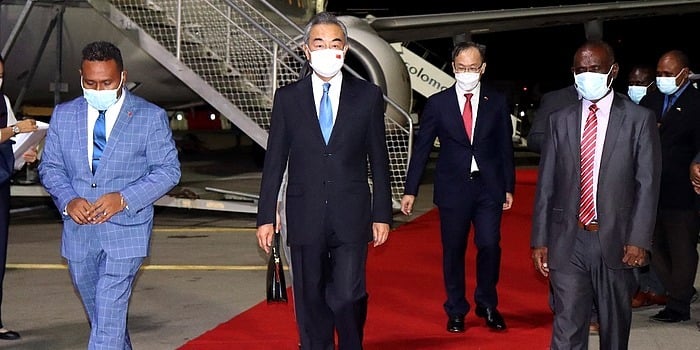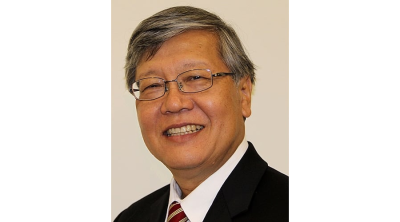HONIARA: China has put forward plans to dramatically expand security and economic cooperation with South Pacific nations, in what one regional leader called a thinly veiled effort to lock them into “Beijing’s orbit”.
The wide-ranging draft agreement and a five-year plan, both obtained by AFP, will be the subject of discussion during Chinese Foreign Minister Wang Yi’s tour of Pacific nations, which began Thursday.
The package would offer 10 small island states millions of dollars in Chinese assistance, the prospect of a China-Pacific Islands free trade agreement and access to China’s lucrative market of 1.4 billion people.
It would also offer China the chance to train local police, become involved in local cybersecurity, expand political ties, conduct sensitive marine mapping and gain greater access to natural resources.
The “comprehensive development vision” is believed to be up for approval when Wang meets regional foreign ministers on May 30 in Fiji.
The South Pacific is increasingly a theater for competition between China and the United States — which has been the primary power in the region for the last century.
Beijing has sought to develop a greater military, political and economic foothold, but until now has made only limited and uneven progress.

‘Shadowy’
“This is China seeking to increase its influence in the region of the world where Australia has been the security partner of choice since the Second World War,” new Australian Prime Minister Anthony Albanese warned Thursday.
Australia “needs to respond”, he said in an interview, outlining plans for a “step-up” in Pacific engagement, with about A$500 million (US$350 million) in aid for defense training, maritime security and infrastructure to combat the effects of climate change.
Australian Foreign Minister Penny Wong was on a flight to Fiji to consult the government about Canberra’s plans, he said.
US State Department spokesman Ned Price warned the countries in question to be wary of “shadowy” agreements with China.
“We are concerned that these reported agreements may be negotiated in a rushed, non-transparent process,” Price told reporters Wednesday, adding that Pacific nations would make their own sovereign choices.
The Chinese plan, if approved, would represent a significant change, facilitating everything from the deployment of Chinese police to visits by Chinese “art troupes”.
Flights between China and the Pacific Islands would increase. Beijing would appoint a regional envoy, supply training for young Pacific diplomats and provide 2,500 government “scholarships”.
But it is also raising alarm bells in regional capitals.
‘Control of our region’
In a stark letter to fellow Pacific leaders, Federated States of Micronesia President David Panuelo warned the agreement seems “attractive” at first glance, but would allow China to “acquire access and control of our region”.
Calling the proposals “disingenuous”, Panuelo said they would deliver Chinese influence over government and industries, and allow “mass surveillance” of calls and email.
“The result”, he said, would be “the fracturing of regional peace, security and stability”.
Micronesia has a compact of free association with the United States, making it one of the region’s closest US allies.
But other Pacific leaders may see the Chinese proposal as possibly lucrative or beneficial.
Policymakers in the United States, Australia, New Zealand and Japan are still reeling from revelations in April that the Solomon Islands secretly negotiated a security agreement with Beijing.
A leaked draft of the agreement contained a provision allowing Chinese naval deployments to the island nation, which lies less than 2,000 kilometers from Australia.
The Solomon Islands has said it will not host Chinese bases, but it is also prohibited from speaking publicly about the deal without China’s permission.
Beijing’s latest proposal would effectively extend key elements of the Solomon Islands agreement to nine other small Pacific nations.
Regional fears
For Washington and its allies, the presence of Chinese forces in the South Pacific would spell an end to decades of efforts to contain China inside the “first island chain”.
It could also require a dramatic repositioning of US forces.
For Beijing, a base or even port access would challenge US hegemony in the region and ease what it sees as encirclement by the West.
Wang touched down in the Solomon Islands’ capital Honiara on Thursday, kicking off a lengthy, eight-nation regional tour.
He is scheduled to sign draft agreements, details of which have not been made public, as well as meet with the country’s prime minister and foreign minister.
Traveling until June 4, Wang will also stop in Papua New Guinea, Fiji, Kiribati and Samoa, as well as hold video calls with Micronesia and the Cook Islands — a self-governing part of New Zealand.
ADVERTISEMENT
ADVERTISEMENT








































